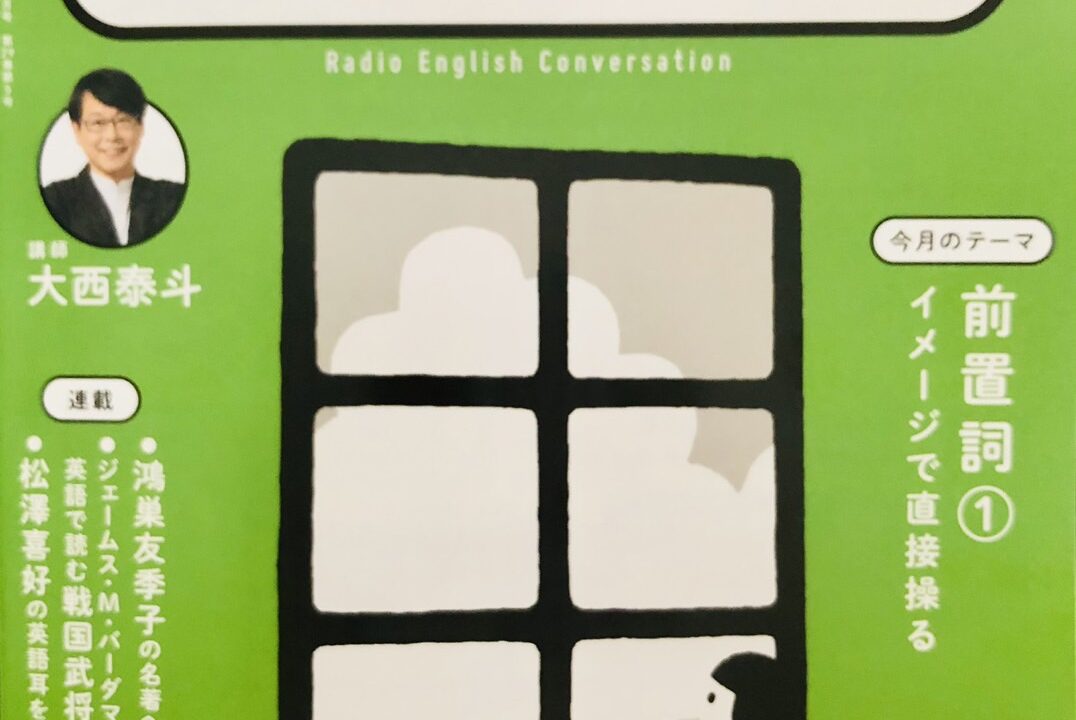【ラジオ英会話】Lesson 84 at のイメージ③ – August 4 Thursday, 2022

August 4 Thursday, 2022
Lesson 84 at のイメージ③
☆Words & Phrases
**noted:
**astronomer:
Welcome back. We’re here today with noted astronomer Dr. Ellie Lansing.
Thank you. It’s great to be here.
**astronomy:
How did you become interested in astronomy?
**once:
**female:
I once saw a movie about a female astronomer.
**related to:
I wanted to at least try something related to space.
**at the moment:
**astronaut:
At the moment, I’m working with the astronauts on Mars.
**be proud of ~:
We’re all proud of the Omega astronauts.
☆Grammar & Vocabulary
① How did you become interested in astronomy?
become を使った説明型オーバーラッピング(SVC)
You became interested in astronomy. の疑問形。
基本は be動詞文と同様に「you = interested in astronomy」だが、単に「=(イコール)」を示す be動詞と異なり、became(〜になった)が使われているため、その意味が文全体にオーバーラップする。
「you = interested in astronomy [になった]」ということ。
② And what are you working on ( ) now?
前置詞の後ろの空所
wh疑問文は「情報の欠落」を相手に埋めてもらう疑問文。
文中には常に「空所 ( )」があり、そこが疑問の焦点である。
この文は、work on ~(〜に取り組む)の後ろが空所で、「何に取り組んでいるのですか?」となる。
☆Key Sentence & Feel English
I wanted to at least try something related to space.
最上級は「最もレベルの高い点」を表すため、「点」を表す前置詞 at は最上級と大変仲がよい。
at least は at と little(少ない)の最上級 least(最も少ない)のコンビネーション。
at least
最小の点でも→少なくとも
となる。
① at most
→ most は many/much(数・量が多い)の最上級
at best
→ best は good の最上級
at worst
→ worst は bad の最上級
② She is at her best.
→ best の「点」にある
I’m at my wit’s end.
→ wit(機知・知恵)の end(終わり)にある
③ He’s good at English.
→ good at ~ は「〜という点において良い(得意)」ということ。bad(悪い)、terrible(酷い)など自由に形容詞は選んで使える。
He’s not a genius at all.
→ at all は「すべての点において」で、not と結びつくと「すべての点において〜ない=全く〜ない」と強い否定になる。
☆Expression in Action
①今日は、私はベストの状態ではありませんでした。
②マリアは人前で話すのが得意です。
**public speaking:
③学生にやる気を出させる方法が見当たりません。途方に暮れています。
**motivate:
☆Ending
O: Hey, Chris. I think you’re very good at public speaking. Is there any way to become good at it?
C: Well, I don’t know if I’m good or not. But I use the answer to such a question with “Preparation is the key.”
But today, I think we shouldn’t underestimate the value of your own voice.
Many presenters are rather “monotonous.”
**monotonous:
But, the best presenters vary their tone of voice a lot to keep the audience’s interest.
**vary:
August 4 Thursday, 2022
Lesson 84 at のイメージ③
(日本語訳・解説付き)
☆Words & Phrases
**noted: 有名な
**astronomer: 天文学者
Welcome back. We’re here today with noted astronomer Dr. Ellie Lansing.
(おかえり=みなさんこんにちは。本日は、著名な天文学者のエリー・ランシング博士をお迎えしています)
※前置詞の with は「〜と一緒にいる」ことを表しています。使い方は「一緒」です。
Thank you. It’s great to be here.
(ありがとう。ここにいることは素晴らしいです=この番組に出られて光栄です)
※it ~ to … の文。最初に「素晴らしいんですよ」と言ってから、何が素晴らしいか?「ここにいることが、ね」と to以下で述べています。
**astronomy: 天文学
How did you become interested in astronomy?
(あなたはどのようにして天文学に興味を持つようになったのですか?)
**once: かつて、以前
**female: 女性の
I once saw a movie about a female astronomer.
(私は以前、女性の天文学者についての映画を見ました)
**related to: 〜に関係している、〜に関連している
I wanted to at least try something related to space.
(私は少なくとも何か宇宙に関係することをやってみたいと思っていました)
**at the moment: 今のところ、目下、当座は
**astronaut: 宇宙飛行士
At the moment, I’m working with the astronauts on Mars.
(今は、火星にいる宇宙飛行士たちと一緒に仕事をしています)
**be proud of ~: 〜を誇りに思う
We’re all proud of the Omega astronauts.
(私たちはみんなオメガの宇宙飛行士たちを誇りに思っています)
※We’re all ~ で「私たちみんな」です。all の位置は様々ですが、we’re all を一言として覚えると all の位置取りに慣れてきます!
☆Grammar & Vocabulary
① How did you become interested in astronomy?
(あなたはどのようにして天文学に興味を持つようになったのですか?)
become を使った説明型オーバーラッピング(SVC)
You became interested in astronomy. の疑問形。
基本は be動詞文と同様に「you = interested in astronomy」だが、単に「=(イコール)」を示す be動詞と異なり、became(〜になった)が使われているため、その意味が文全体にオーバーラップする。
「you = interested in astronomy [になった]」ということ。
② And what are you working on ( ) now?
(それで、あなたは現在何に取り組んでいるのですか?)
前置詞の後ろの空所
wh疑問文は「情報の欠落」を相手に埋めてもらう疑問文。
文中には常に「空所 ( )」があり、そこが疑問の焦点である。
この文は、work on ~(〜に取り組む)の後ろが空所で、「何に取り組んでいるのですか?」となる。
☆Key Sentence & Feel English
I wanted to at least try something related to space.
(私は少なくとも何か宇宙に関係することをやってみたいと思っていました)
最上級は「最もレベルの高い点」を表すため、「点」を表す前置詞 at は最上級と大変仲がよい。
at least は at と little(少ない)の最上級 least(最も少ない)のコンビネーション。
at least
最小の点でも→少なくとも
となる。
① at most
せいぜい(多くても)
→ most は many/much(数・量が多い)の最上級。at を用い「最も数量が多い点で」となる
at best
最良の場合(せいぜい良くても)
→ best は good の最上級。at を用い「最良の点で」を表す
at worst
最悪の場合
→ worst は bad の最上級。at を用い「最悪の点で」を表す
② She is at her best.
彼女はベストの状態(絶好調)です。
→ best の「点」にある
I’m at my wit’s end.
私は途方に暮れて(ほとほと困って)います。
→ wit(機知・知恵)の end(終わり)にあり、万策尽きて「何をすればいいのか分からない」ということ
③ He’s good at English.
彼は英語が得意です。
→ good at ~ は「〜という点において良い(得意)」ということ。bad(悪い)、terrible(酷い)など自由に形容詞は選んで使える。
He’s not a genius at all.
彼は天才などではまったくありません。
→ at all は「すべての点において」で、not と結びつくと「すべての点において〜ない=まったく〜ない」と強い否定になる。
☆Expression in Action
①今日は、私はベストの状態ではありませんでした。
I wasn’t at my best today.
②マリアは人前で話すのが得意です。
Maria is good at public speaking.
**public speaking: 演説、公の席で話をすること
③学生にやる気を出させる方法が見当たりません。途方に暮れています。
I can’t find a way to motivate my students. I’m at my wit’s end.
**motivate: (人を)やる気にさせる
☆Ending
O: Hey, Chris. I think you’re very good at public speaking. Is there any way to become good at it?
C: Well, I don’t know if I’m good or not. But I use the answer to such a question with “Preparation is the key.”
But today, I think we shouldn’t underestimate the value of your own voice.
Many presenters are rather “monotonous.”
**monotonous: 単調な、一本調子の、変化のない、退屈な
But, the best presenters vary their tone of voice a lot to keep the audience’s interest.
**vary: (いろいろに)変える、変化を添える
August 4 Thursday, 2022
Lesson 84 at のイメージ③
(日本語→英語バージョン)
☆Words & Phrases
**有名な:
**天文学者:
おかえり=みなさんこんにちは。本日は、著名な天文学者のエリー・ランシング博士をお迎えしています
→
※前置詞の with は「〜と一緒にいる」ことを表しています。
ありがとう。ここにいることは素晴らしいです=この番組に出られて光栄です。
→
**天文学:
あなたはどのようにして天文学に興味を持つようになったのですか?
→
**かつて、以前:
**女性の:
私は以前、女性の天文学者についての映画を見ました。
→
**〜に関係している、〜に関連している:
私は少なくとも何か宇宙に関係することをやってみたいと思っていました。
→
**今のところ、目下、当座は:
**宇宙飛行士:
今は、火星にいる宇宙飛行士たちと一緒に仕事をしています。
→
**〜を誇りに思う:
私たちはみんなオメガの宇宙飛行士たちを誇りに思っています。
→
① せいぜい(多くても)
→ most は many/much(数・量が多い)の最上級。at を用い「最も数量が多い点で」となる
最良の場合(せいぜい良くても)
→ best は good の最上級。at を用い「最良の点で」を表す
最悪の場合
→ worst は bad の最上級。at を用い「最悪の点で」を表す
② 彼女はベストの状態(絶好調)です。
→ best の「点」にある
私は途方に暮れて(ほとほと困って)います。
→ wit(機知・知恵)の end(終わり)にあり、万策尽きて「何をすればいいのか分からない」ということ
③ 彼は英語が得意です。
→ good at ~ は「〜という点において良い(得意)」ということ。bad(悪い)、terrible(酷い)など自由に形容詞は選んで使える。
彼は天才などではまったくありません。
→ at all は「すべての点において」で、not と結びつくと「すべての点において〜ない=まったく〜ない」と強い否定になる。


